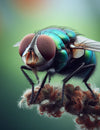
When it comes to mosquito control, spraying is one of the most common solutions that is used by people. When one wants to stay away from mosquito buzzing and biting, they go for chemical-based or organic spraying.
But they don’t consider the fact that only spraying will not help them get rid of mosquitoes. In addition to this, if chemical sprays are being used, they will harm the ecosystem as well.
Then the question is what should be done?
There is a scientific-based program name IMM (Integrated Mosquito Management). IMM (Integrated Mosquito Management) has been eminent as the safest solution against the mosquito. This management includes abatement of mosquitoes using biological means/programs.
As IMM uses biological ways it has no side effects or bad effects on the environment as well.
What is IMM (Integrated Mosquito Management?)
IMM is a program that uses biological agents to deal with a mosquito in addition to minimizing the negative effect on the environment. This method doesn’t only use the spray to control mosquito instead work on controlling larvae, sources, etc.
IMM is all about biological control, and its most important aspect in biological agents.
You may interested in - What is natural pest control?
Use of biological agent in IMM (Integrated Mosquito Management)
Biological agents are a bacterium, fungus, virus, parasite, toxin, etc that is used as a weapon against a pest that is troublesome.
One of the most common biological agents used against mosquitoes is Bti or Bacillus thuringiensis israelensis. The other very useful biological agent against mosquitoes is Bs (Bacillus sphaericus).
Bti got commercially available once it has shown tremendous effect against mosquito larvicide, along with fewer ranges. Bti-based products are easily available in markets. It can be used as backpack foggers for a small area or airplane foggers for a large area.

Bti is economically safe to use as it has a negligible effect on the environment.
On the other side, Bs (Bacillus Sphaericus) also targets mosquito larvae. Bs has quite a different toxic than Bti. Bs tends more expensive than Bti, this makes it a less used compound in the IMM program.
However, it is very effective in case of controlling mosquitoes of Culex Genus.
On the other hand, Entomopathogenic fungi are also used against mosquitoes in bio-control programs. Entomopathogenic fungi are used for adult mosquitoes.
It produces infective spores that are attached to the cuticle of the mosquito, and then releases of toxins will result in the termination of the mosquito.
Mosquito Predators
A natural enemy that feeds on mosquito larvae and pupa can be a key element to reducing the mosquito population.
The most commonly used enemy for biological control of mosquitoes is the use of predatory fish. However, it’s not a practical and legal method of controlling mosquitoes, as it can have negative effects on other environmental insects.
To use the predatory fish method requires a lot of consideration and careful assessment of the prior site.
Several Omnivores such as Cyclops Vernalis, megacyclops formosanus, mesocyclops, etc are known to prey on the young larval stage of the mosquito.
Mosquito termination based on their behavior

Knowledge about the mosquito life cycle and its species can help in terms of mosquito termination.
Grater the knowledge easier to solve the problem.
You might like - What is right time for mosquito spray?



